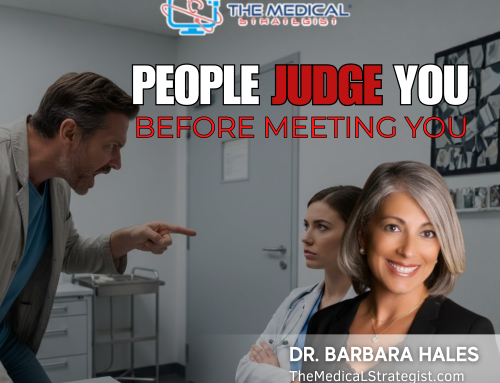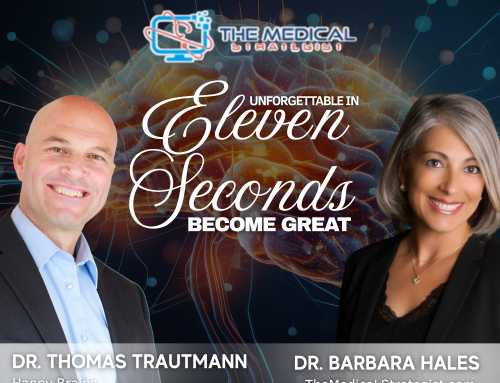Podcast: Play in new window | Download
Subscribe: RSS
In this episode of Marketing Tips for Doctors, host Dr. Barbara Hales dives into one of the most talked-about topics in healthcare today—Artificial Intelligence in Medical Practice. Rather than stoking fears of robotic replacements, Dr. Hales presents AI as a powerful ally, helping doctors reclaim their time, reduce burnout, and enhance patient care.
Through real-life stories, Dr. Hales demonstrates how AI is already subtly integrated into everyday tools such as EHRs, billing software, voice dictation apps, and chatbots. But the heart of the episode focuses on the human side of AI. From a rural pediatrician who finally had time to tuck her kids in at night thanks to an AI scribe, to a patient who credited early kidney disease detection to an AI alert system, this episode celebrates how technology can extend—not replace—the compassion in healthcare.
Dr. Hales breaks down the myths, addresses common fears about AI depersonalizing care, and encourages providers to view AI not as a threat but as a time-saving partner that allows them to focus more on listening, connecting, and building trust. She also provides quick wins for getting started with AI in your practice—no tech degree required.
Key Takeaway:
“Let AI handle the data. You handle the heart.” – Dr. Barbara Hales
Connect with Barbara Hales:
Twitter: @DrBarbaraHales
Facebook: facebook.com/theMedicalStrategist
Business Website: www.TheMedicalStrategist.com
Show website: www.MarketingTipsForDoctors.com
Email: Barbara@TheMedicalStrategist.com
Books:
YouTube: TheMedicalStrategist
LinkedIn: www.linkedin.com/in/barbarahales
TRANSCRIPTION
Welcome and Introduction
Dr. Barbara Hales (00:03) Welcome to another episode of Marketing Tips for Doctors. I’m your host, Dr. Barbara Hales, and today we will be talking about a topic that’s been buzzing in both tech and medical circles alike. Artificial Intelligence in the world of healthcare, so the human touch in an AI world, how artificial intelligence is shaping medical practice. Now, before you roll your eyes, think, great, another robot takeover story. Hold on. Today’s episode isn’t about replacing you, it’s about empowering you. And I’ve got three heart-warming stories that might just shift your perspective. We’ll cover what AI actually means for private practice, how it’s being used right now, in ways you might already be benefiting from the emotional, human side of AI. Yes, it exists. And finally, how you can prepare without losing your personal touch, let’s begin.
What is AI in Healthcare
Dr. Barbara Hales (00:45) When we say AI, most people think of robots during surgery or chat, GPT writing patient notes, and while those headlines get clicks, AI in medical practice is often far simpler and more practical. AI includes algorithms that scan radiology images faster than humans do, tools that suggest diagnoses based on EMR patterns, chatbots for patient intake and FAQs, and predictive tools for identifying patients at risk for hospitalization. But here’s the key. AI augments care. It doesn’t replace it. It’s like having a really smart assistant who never sleeps, never gets tired, and can remember every case file instantly. Now that sounds helpful, doesn’t it?
Real Story: Dr. Patel and AI Documentation
Dr. Barbara Hales (01:28) Let me tell you about Dr. Patel, a solo pediatrician in a small rural town. Her biggest challenge wasn’t just treating kids, it was the administrative overload. She was spending three hours every evening catching up on notes. She decided to try an AI documentation tool that listened to her during exams and summarized everything for the EMR, “I felt like I had a life again.” She told me, “I made dinner, I tucked my kids into bed, and I didn’t feel like I was drowning.” That’s the kind of impact AI can have. It’s not flashy, it’s freedom.
Everyday AI Tools You May Already Use
Dr. Barbara Hales (02:10) You may not realize it, but if you’re using any of the following, you are already using AI, EHRs with predictive alerts, voice dictation tools, appointment scheduling systems that optimize slots, billing software that flags anomalies, and chatbots on your website. The point isn’t to adopt AI for the sake of trendiness; it’s to solve problems you already have to reduce burnout, streamline workflows, improve patient satisfaction, and enhance diagnostic accuracy.
Real Story: Predictive Alert Saves Patient
Dr. Barbara Hales (02:46) One of my colleagues shared a case involving a 57-year-old patient with type 2 diabetes. His numbers were slowly declining, but not alarmingly, so the clinic had implemented an AI system that scanned lab results against historical trends. It flagged a subtle but dangerous pattern in his hemoglobin A1C and renal function. The system sent an alert. The doctor brought him in for a deeper evaluation, and they caught early-stage kidney disease before symptoms appeared. He looked at me and said, “You just gave me 10 more years with my granddaughter.” That’s AI and the human connection working in tandem.
Addressing Doctors’ Fears About AI
Dr. Barbara Hales (03:28) Let’s address the elephant in the room. Doctors often fear that AI will replace jobs, depersonalize care, erode trust between provider and patient. But here’s the truth: AI can do tasks, not build relationships. AI can remember data, not read emotions. AI can streamline workflow, but it will never offer empathy after a bad diagnosis. Think of it like this. You don’t need to be the person manually filling every paper chart anymore. What a relief. AI can give you back the time to be more human.
Real Story: OB-GYN and the AI Chatbot
Dr. Barbara Hales (04:04) Here’s an OB GYN, unexpected bond, a physician friend, an OB-GYN was nervous when her group added an AI chatbot to handle pre-visit, education, and FAQs. She was afraid it would feel cold, but what she found was the opposite. One patient came in and said, “Thank you for answering my questions at 2 am I was freaking out.” It wasn’t her, but the patient felt comforted because the information was personalized and timely, and that built more trust. When the OB finally walked into the room, the doctor said, “For the first time in a while, I didn’t start the visit by explaining something. I started by connecting.”
Quick Wins to Start with AI
Dr. Barbara Hales (04:47) You don’t need a tech degree to start integrating AI into your practice. Start small. Quick wins include using voice-to-text tools like Dragon or Suki, implementing an appointment bot to reduce phone calls. Try an AI triage assistant on your website and use ChatGPT, yes, ChatGPT, to help write content, social posts, or scripts. Always ask, Will this tool save me time or make my patients feel more heard? If the answer is yes, give it a try.
The Increasing Value of Human Skills
Dr. Barbara Hales (05:22) Here’s the irony: the more efficient AI becomes, the more valuable your human skills are, including empathy, nuance, listening, and advocacy. These cannot be replicated. The future isn’t man or machine, it’s man with machine. Use AI to reduce the noise so you can lean into the relationship part of medicine, the reason most of us went into healthcare in the first place.
Closing and Call to Action
Dr. Barbara Hales (06:05) I hope today’s episode gave you both hope and clarity. AI isn’t the enemy, it’s an ally. And here’s your takeaway for today: let AI handle the data. You handle the heart. If you want to learn how to start integrating smart tools into your private practice without losing your authenticity. Let’s talk. Book a free discovery. Call me at the Medical the medical strategist.com, forward slash, contact. Also, if you found today’s episode helpful, please share it with a colleague. The more we talk about this, the more empowered we all become. Until next time, stay human, stay curious, and remember your care is irreplaceable. This has been your host, Dr. Barbara Hales, until next time.



